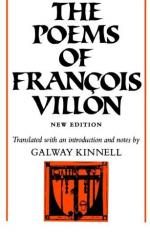|
This section contains 6,927 words (approx. 24 pages at 300 words per page) |

|
SOURCE: “‘Faulte d'Argent M'a Si fort Enchanté’: Money and François Villon,” in Romance Studies, Vol. 24, 1992, pp. 59-70.
In this essay, Freeman contends that the critical tendency to interpret Villon as a precursor to Romantic poets has caused scholars to overlook the importance of money and poverty in Villon's oeuvre. Focusing on Le Lais and Le Testament, Freeman suggests that the modern view of the Romantic starving artist cannot take into account Villon's real desire and need for material security.
Since he was rediscovered at the beginning of the 19th century (one thinks of Théophile Gautier's seminal chapter in Les Grotesques for example), François Villon has become best known as the poet of passing time, of regret for misspent youth, of the pangs of dispriz'd love, and of the vanity of human wishes.1 His work has been widely—if patchily—anthologized, and what is perhaps his...
|
This section contains 6,927 words (approx. 24 pages at 300 words per page) |

|


